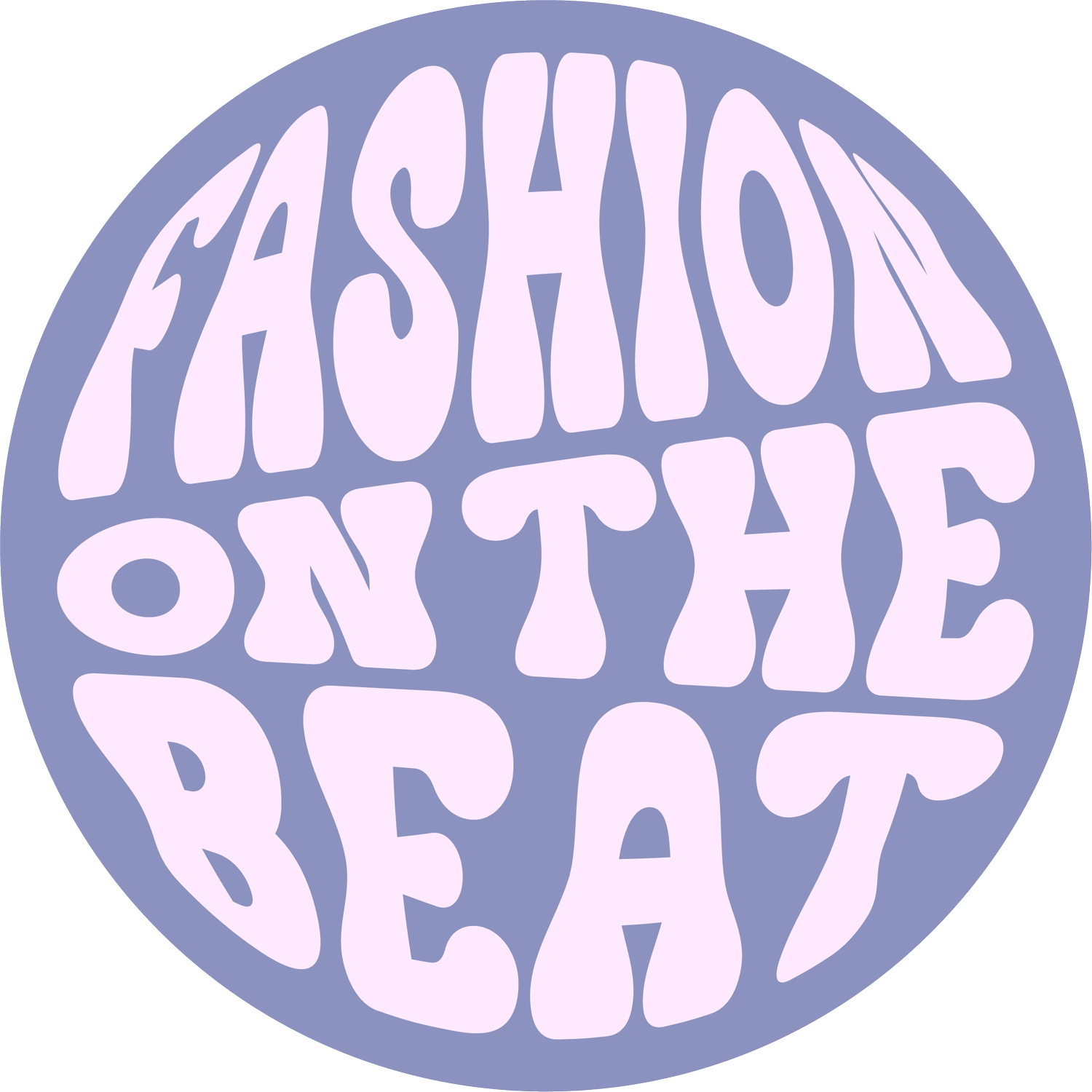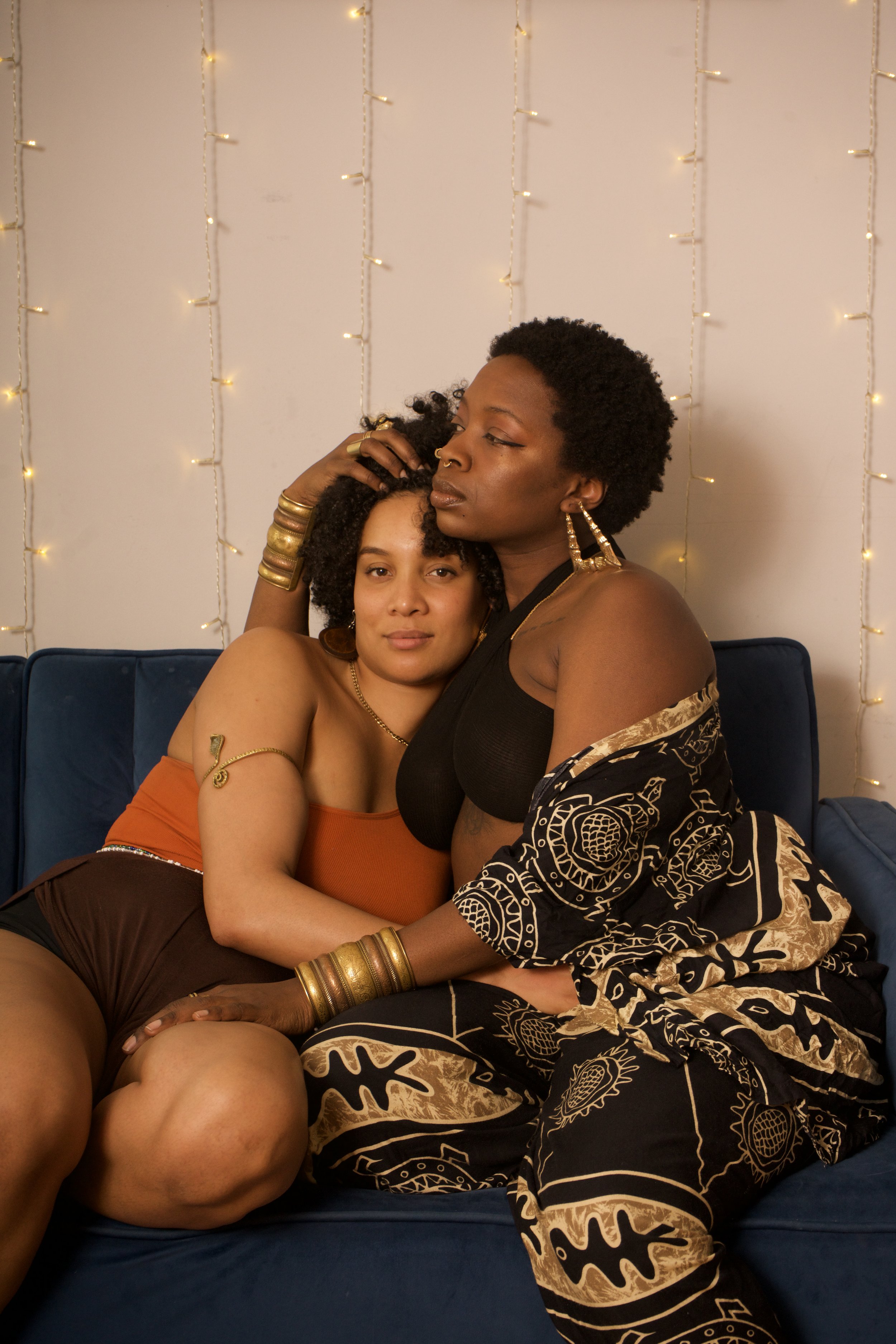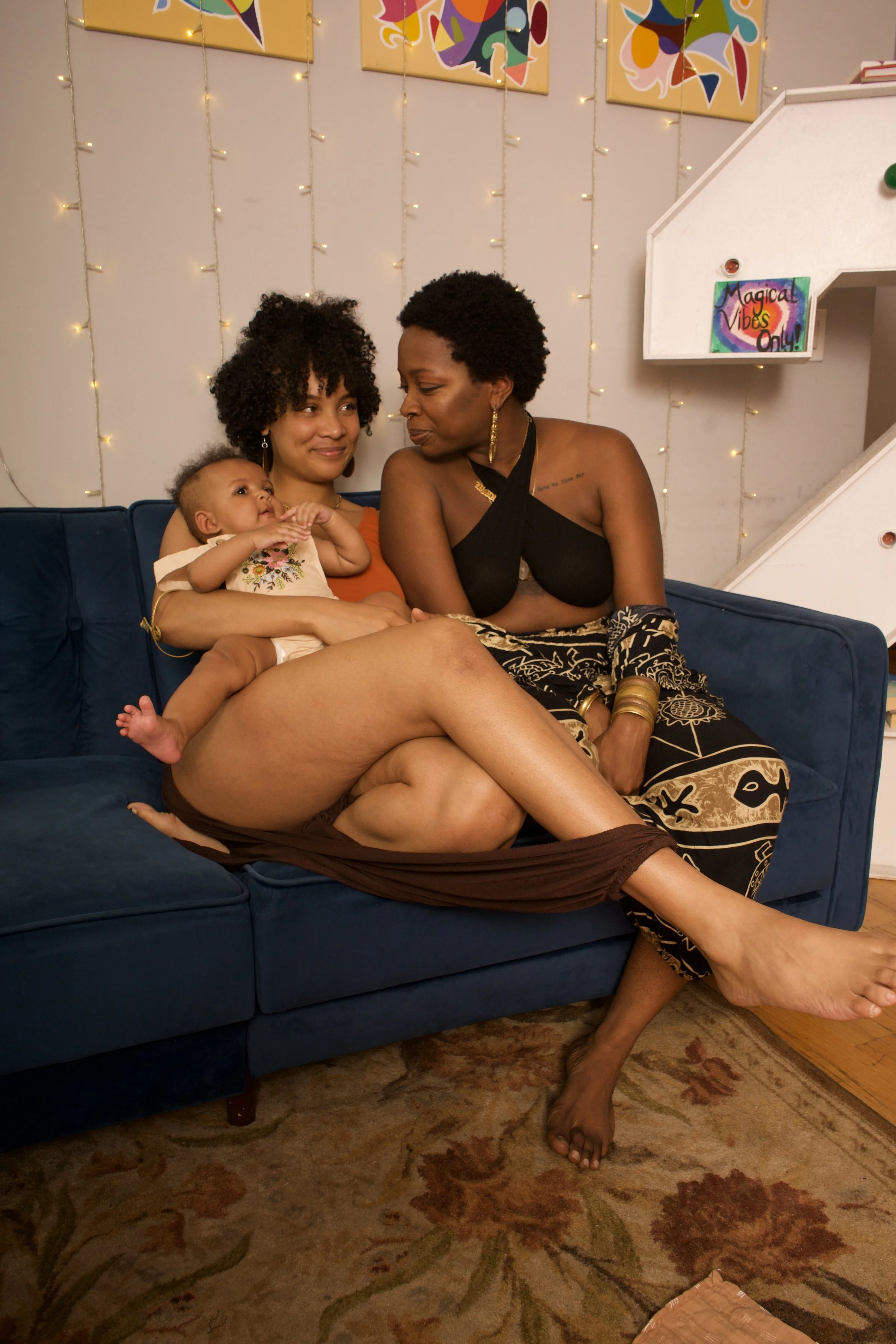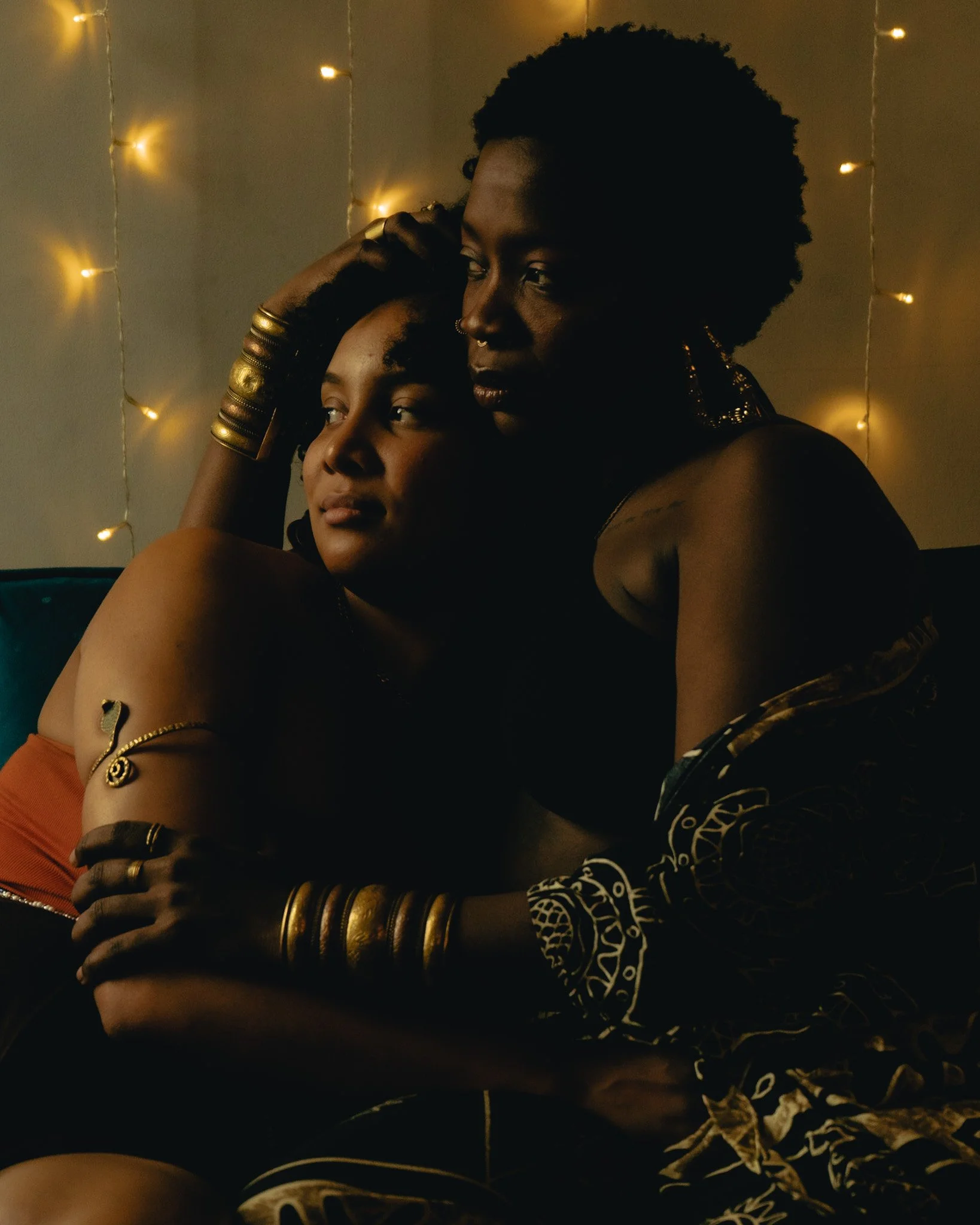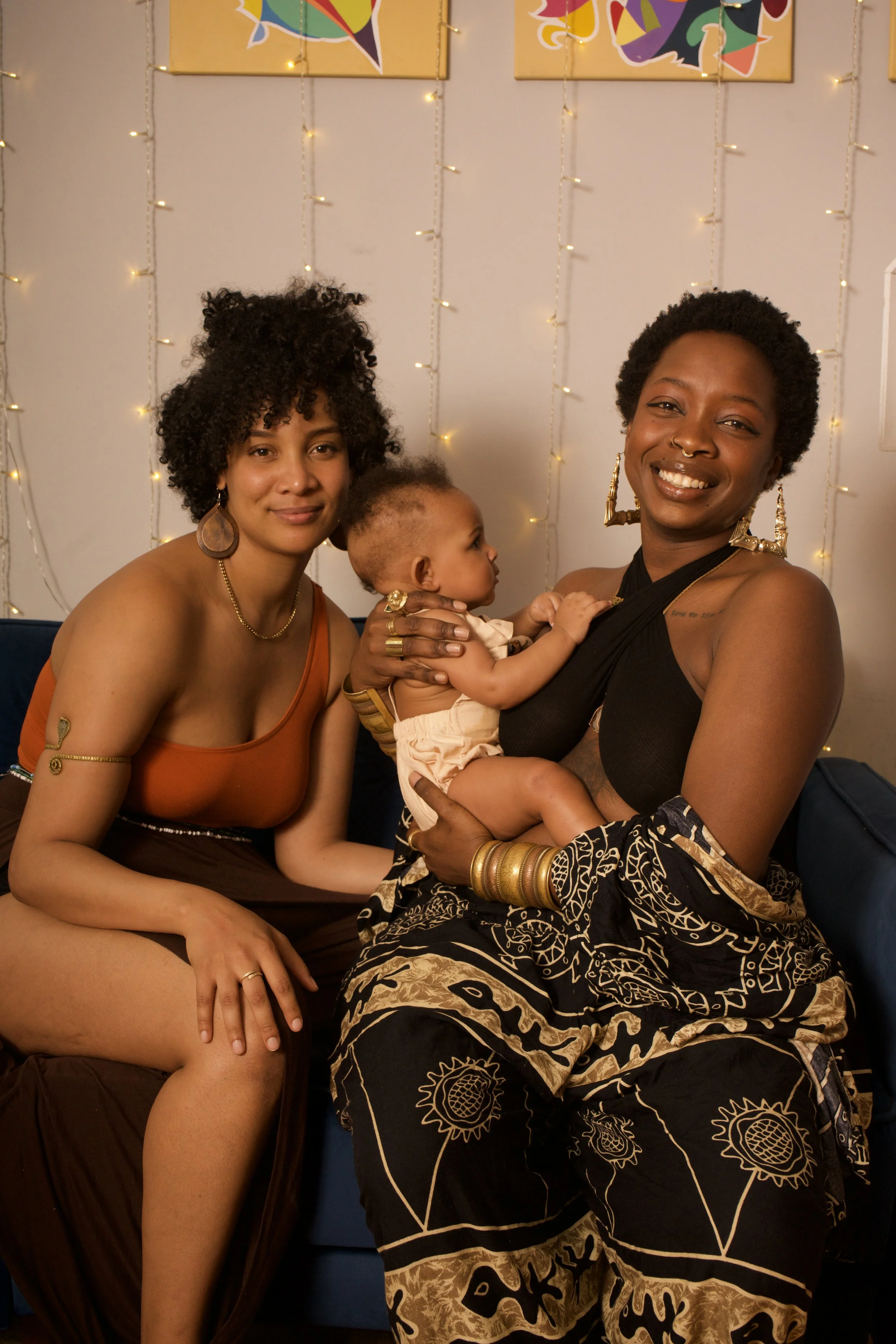Sunni and LVNDR, a ray of floral sunshine in Brooklyn
Meeting Sunni and LVNDR (read as in “Lavender”) trasmitted me a unique sense of vitality, togetherness, and partnership: pure love. Their names reflect their personalities: Sunni, a smiley ray of sunshine, and LVNDR, a tender flower.
Imagine a gently scented lilac flower in a bright sun-lit living room. Imagine a warm ray of sunshine illuminating these flower’s petals. With this scene in my mind, that’s how I picture Sunni and LVNDR, their relationship, their journey, and their creative personalities. It was an absolute pleasure to experience their presence with baby Robyn, their small yet majestic beauty.
You can feel the love in the air when you’re in front of them. During our conversation, I felt like a student as they were expressing insightful takes on how it is like to be a Black queer person, couple, or family, in a world where there are more unaccepted realities than acceptable truths. As an ally, I placed myself in a position of learning and listening, because even though we might share race and gender, there are other aspects of their identities that I can only learn from and help get their perspectives broader and known to other communities, the ones I’m part of.
Photography: Timothy White
LVNDR is a queer pansexual woman. She writes, models, and sings. In addition to that, she creates waist beads and dedicates her time to designing these works. Sunni is an artist who recently got her Masters' degree from NYU. Sunni goes by @justsunni on TikTok, where she shares content that focuses on maternity tips and culinary practices for individuals on WIC (check her book here) with her audience of +61K. As you can tell, this is a talented and shining creative power couple.
For Black Queer Love Joy, Sunni and LVNDR were kind to share their story and views on love, creativity, and so much more, along with what the city of New York was able to foster a safe and energetic space for people who look and live love like them.
Photography: Timothy White
What was the first thing you noticed when you met each other?
LVNDR: How beautiful she was. And her infectious laugh.
Sunni: I noticed her smile and her sense of humor - she lights up a room and has a gift for making everyone around her comfortable.
What is love?
LVNDR: I think that for me I can say words that express and make me think of love: communication, time, focus, intention.
Sunni: I think that love is a choice and it allows you to tap into your divinity. I feel that we all know at our core what is loving and through our bodies, we make the choice to align with that.
How does your queerness and your approach to love affect your creativity?
LVNDR: As far as music is concerned, I’d like to discuss more queer love in general. I don’t know how many Black creators do that and it would be nice to see representation that is Black people in NY and in the world that are queer and love people of the same gender. With modeling, I feel that there should be more Black queer showcasing, along with non-binary. The way you may visually look at someone or the way society makes you want to see them in a certain way doesn’t always align with who you really are. Being a queer model means that too and I’d like to see that more.
Sunni: I think that my queerness makes me limitless! My approach to queerness and, relationships gives me a new perspective because I have to forge my identity and my approach to love every day. I take that same audacity into how I approach creative works.
How can nonnormative, unbelongingness, and unassimilation be a form of freedom under systems of racism, sexism, and cissexism?
LVNDR: I really appreciate being queer. I feel that because of this label I’m allowed to step into any element that I want while showing people who look and are like me a fearless avenue of expression. I just am. I don’t feel like I need to be any particular thing because of my body parts, genitalia, or anything that I have. It’s broad and limitless being queer.
SUNNI: I think that I find my freedom in accepting that because of the way the world is constructed I don’t think that it’s meant to serve me and my community, specifically in the United Stated. What I do find in the community is the ability to reconstruct our world and decide how we want to engage with each other, along with how we want to break free from capitalistic expectations. We have to build our world ourselves, separately and in communion at the same time.
What is your nonbinary vision for a world without systems of white supremacy, cissexist patriarchy, and capitalism?
LVNDR: Navigating the ways I want to be as a person, without forcing myself to be femme or other categories and labels. Creatively, I want to express myself, there’s no binary option. I can be anything. People are afraid to live their lives freely and they rather stick under one label and inside a singular box, when they can actually explore other options if they want to. They want to be safe and make sense without being themselves.
Sunni: I want to make sure that my work is as accessible as possible, by breaking down the physical, financial, and mental barriers. Sometimes it is your own community that puts up those barriers for you so you become accustomed to the idea that you can only be one thing. Being organically myself helps me create the spaces and the opportunities that some people might see themselves in. Having hard conversations and talking about alternatives is important too, an essential tool to educate people.
How do you live and feel empowered in your own sexuality? Does NYC give you enough space to do so?
LVNDR: NYC is a melting pot of sexual identities. I feel very safe here expressing who am I and who I choose to love. Luckily I don’t live in a city where my freedom to express myself openly is taken from me. Once I was able to break off from the ways and the environment I was born into, I could see how many different people were around me. I allowed myself to embrace this vision of life instead of being judgmental based on the type of upbringing I had. I started to see who I wanted to be. I think that this was possible only because I was in New York, though. If I were in any other part of the United States, especially a small town with closed-minded people, I probably woudln’t see my lifestyle possible. Overall I always felt that my choices could be transformed into reality due to where I was based, which happened to be New York City. Seeing the many kinds of people that live and pass-through this city was inspirational for me to believe that my persona would be accepted.
Sunni: I feel empowered in my sexuality by choosing to tap into my divine sensuality every day. That means practicing pleasure with myself, my partners, and accepting all of them and the version of myself they reflect back to me. When I was growing some terrible things happened to me. Even if I was traveling to so many different places, I was still trying to find that perfect place where I could feel I could be myself and I think that I found this place in Brooklyn. I feel safer here, compared to other places. I see many kinds of individuals and I feel confident in my skin when I am here. I think that is why I feel so passionately about creating safe and accessible spaces with my work so that people can speak up for themselves because I saw many horrific things when I was younger.
Photography: Timothy White
What kind of love do you want to portray and nurture as a role model for your daughter?
LVDNR: As a caregiver, I want Robyn to know that she is free to love as she chooses to. That love should be healthy and pure and consistent. That smiles and laughs are abundant and she will always matter.
Sunni: I hope she learns unconditional love and how to gracefully give others the freedom to grow into the best version of themselves. I hope she learns to feel safe in love.
